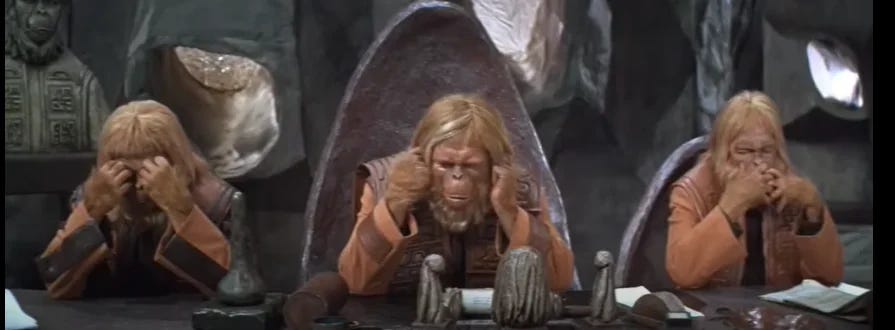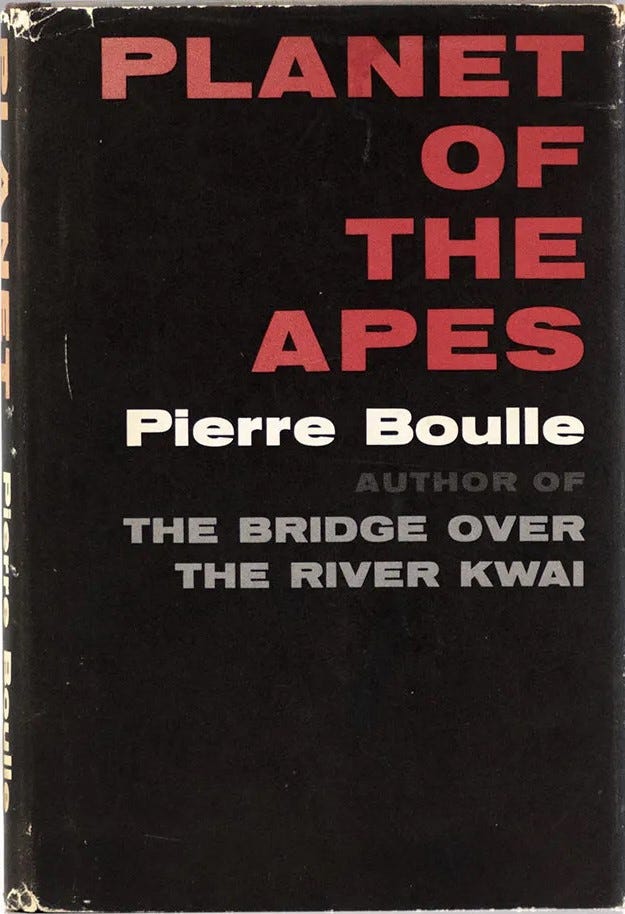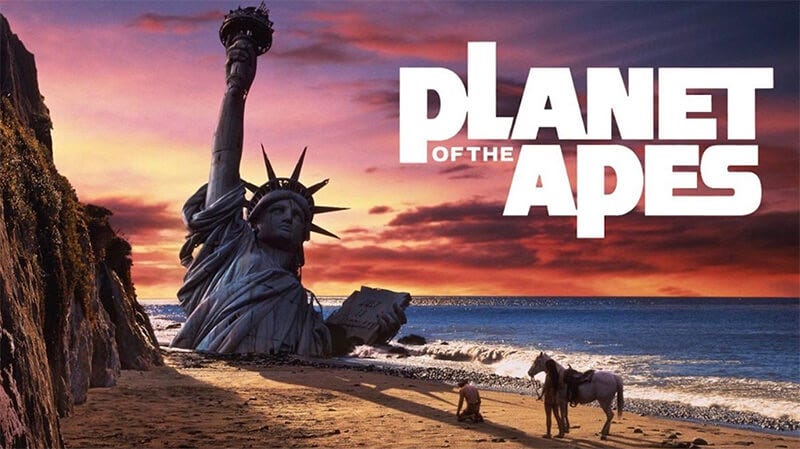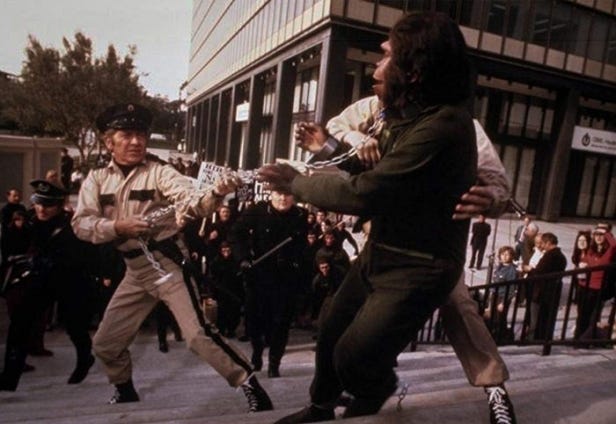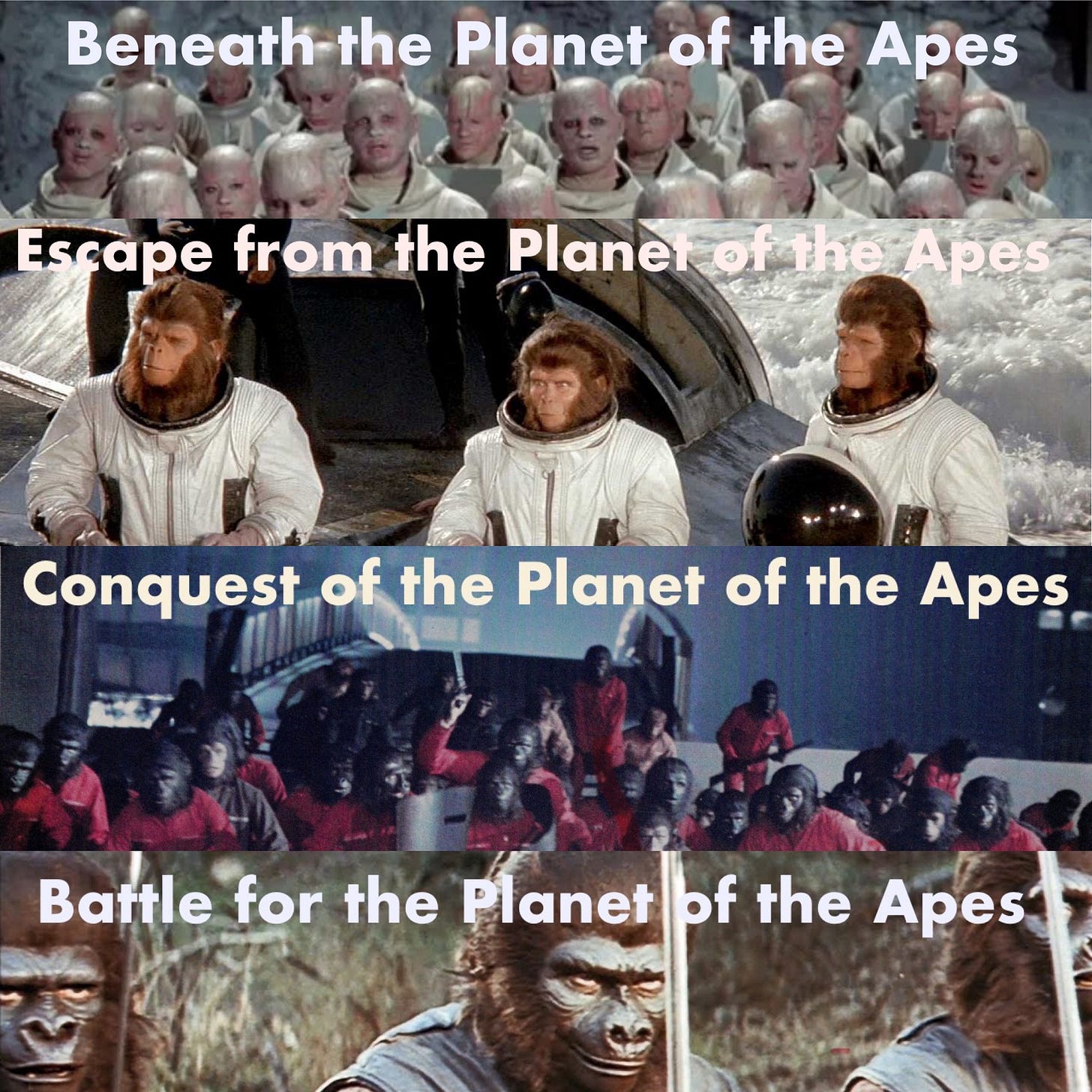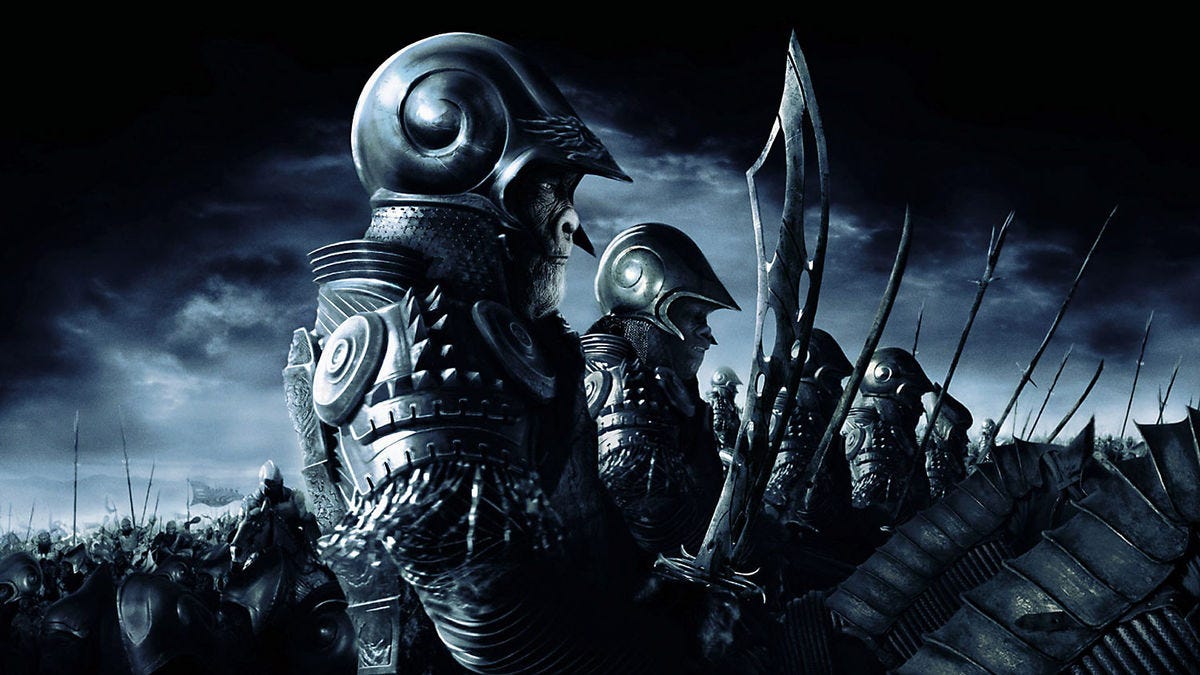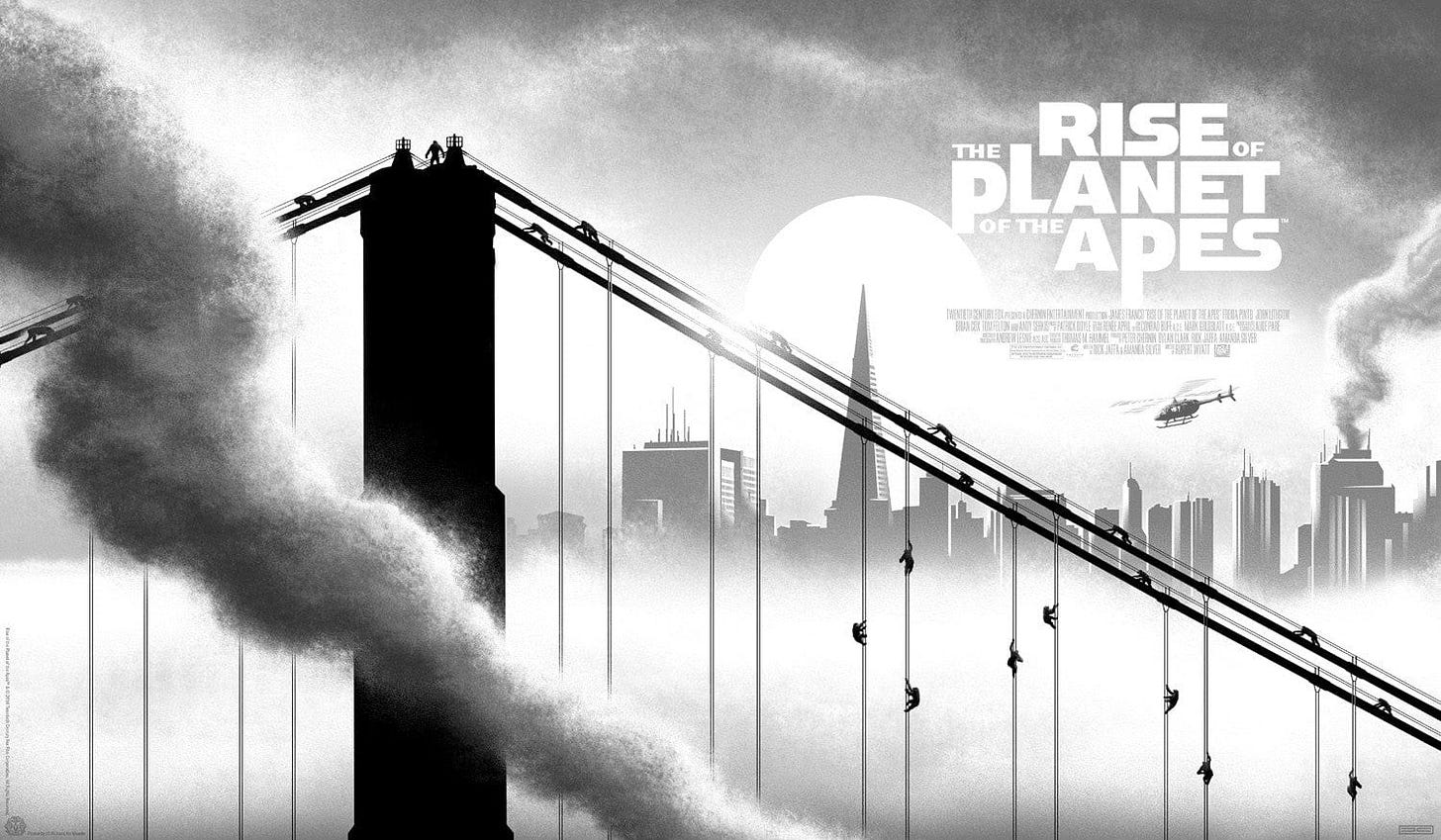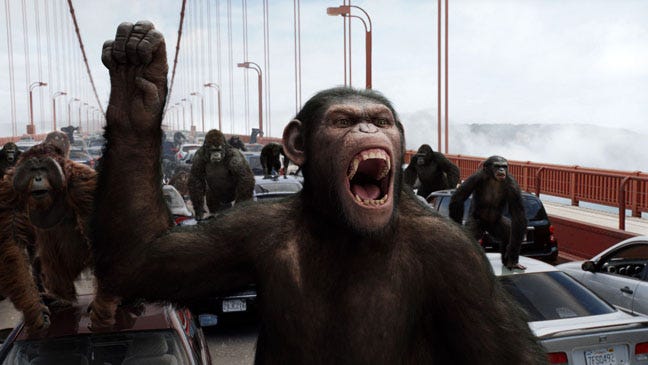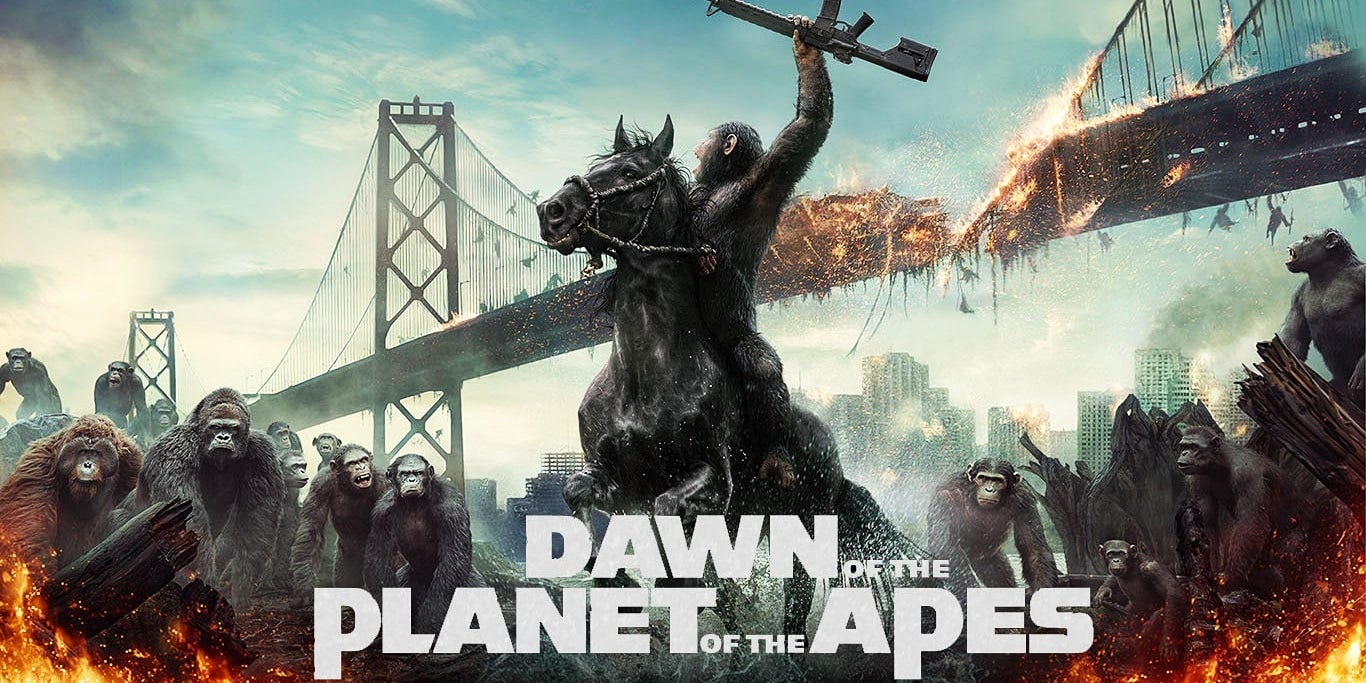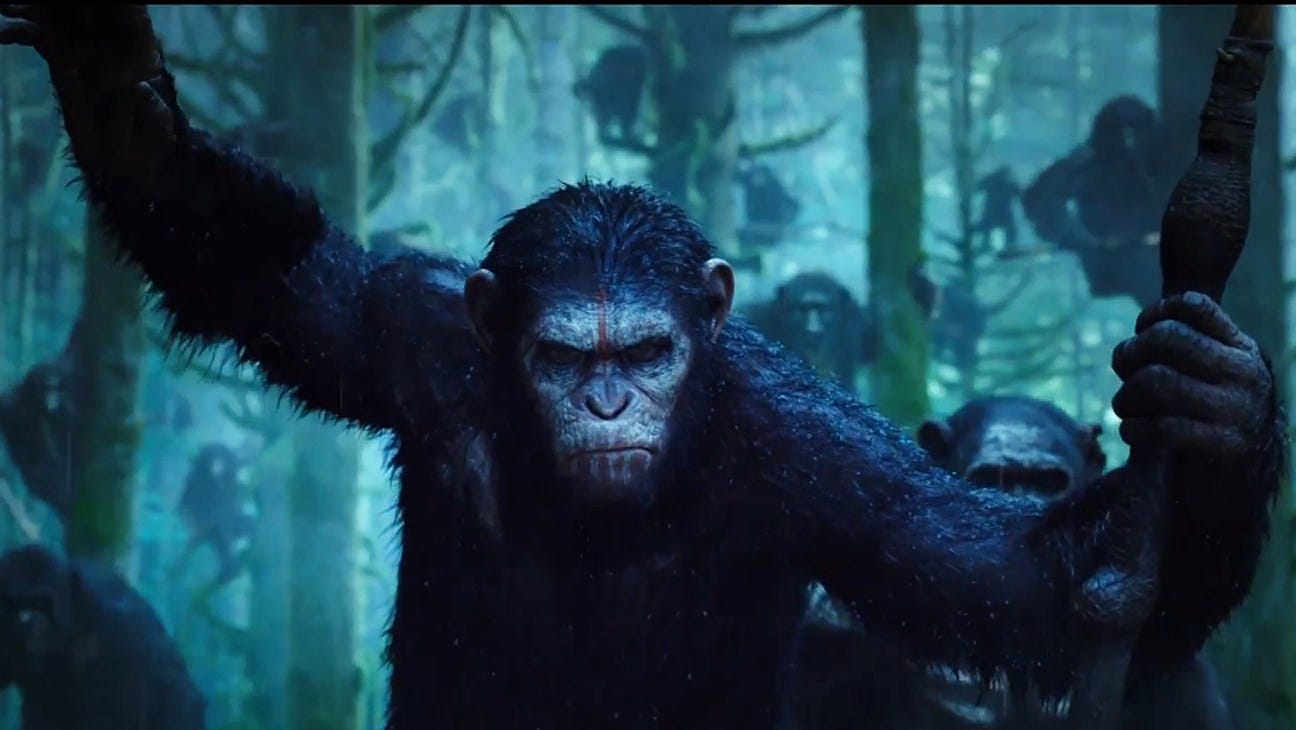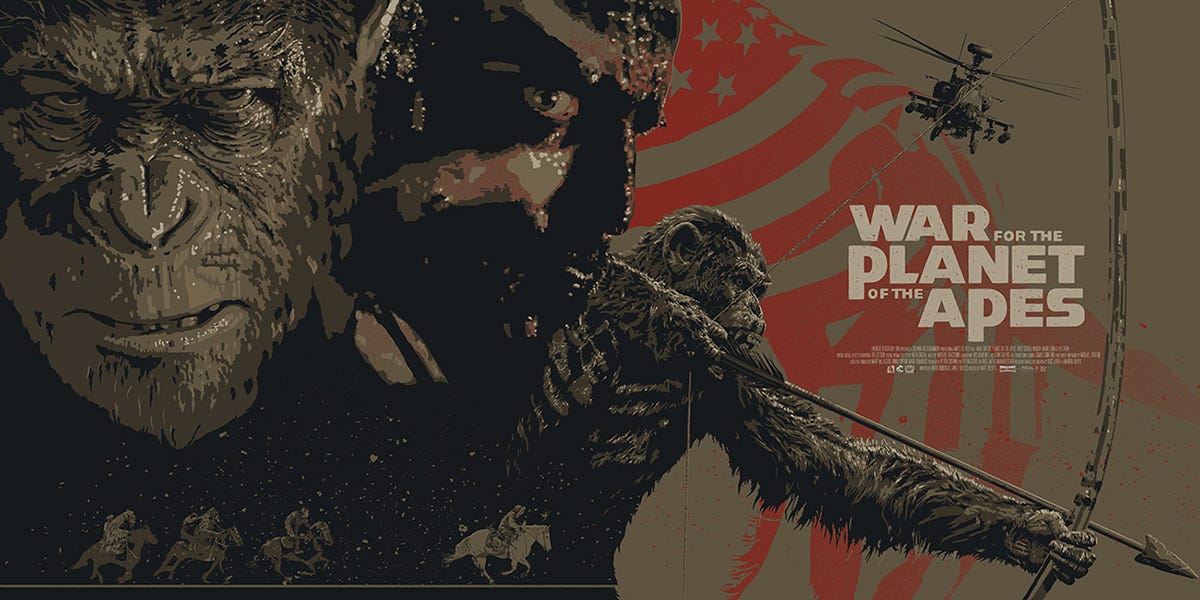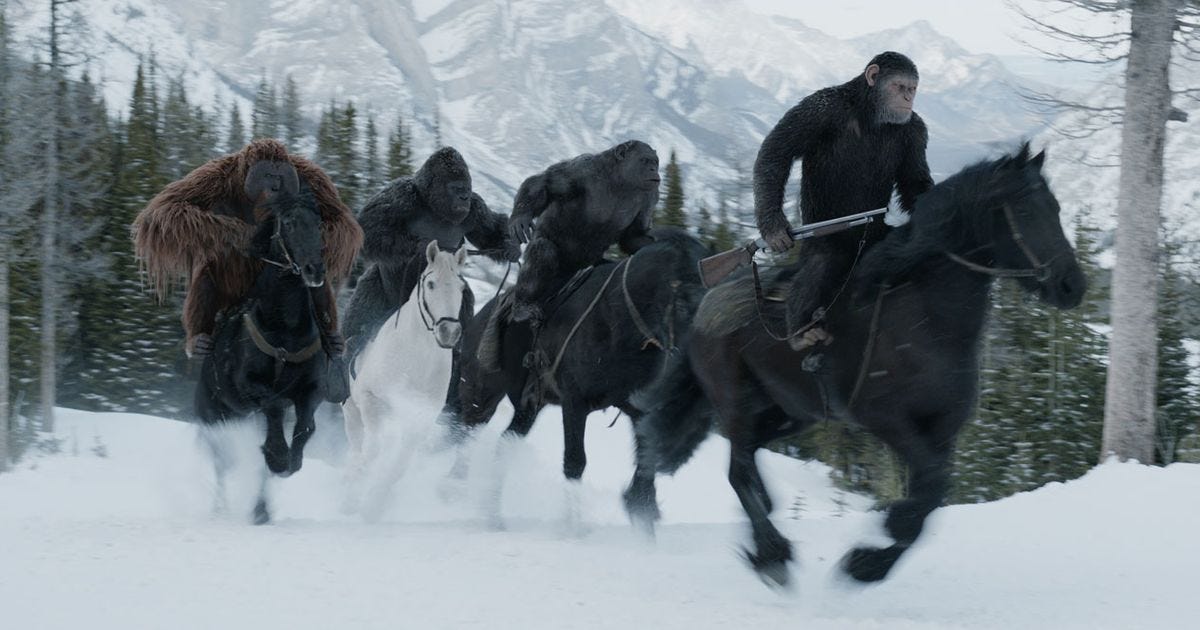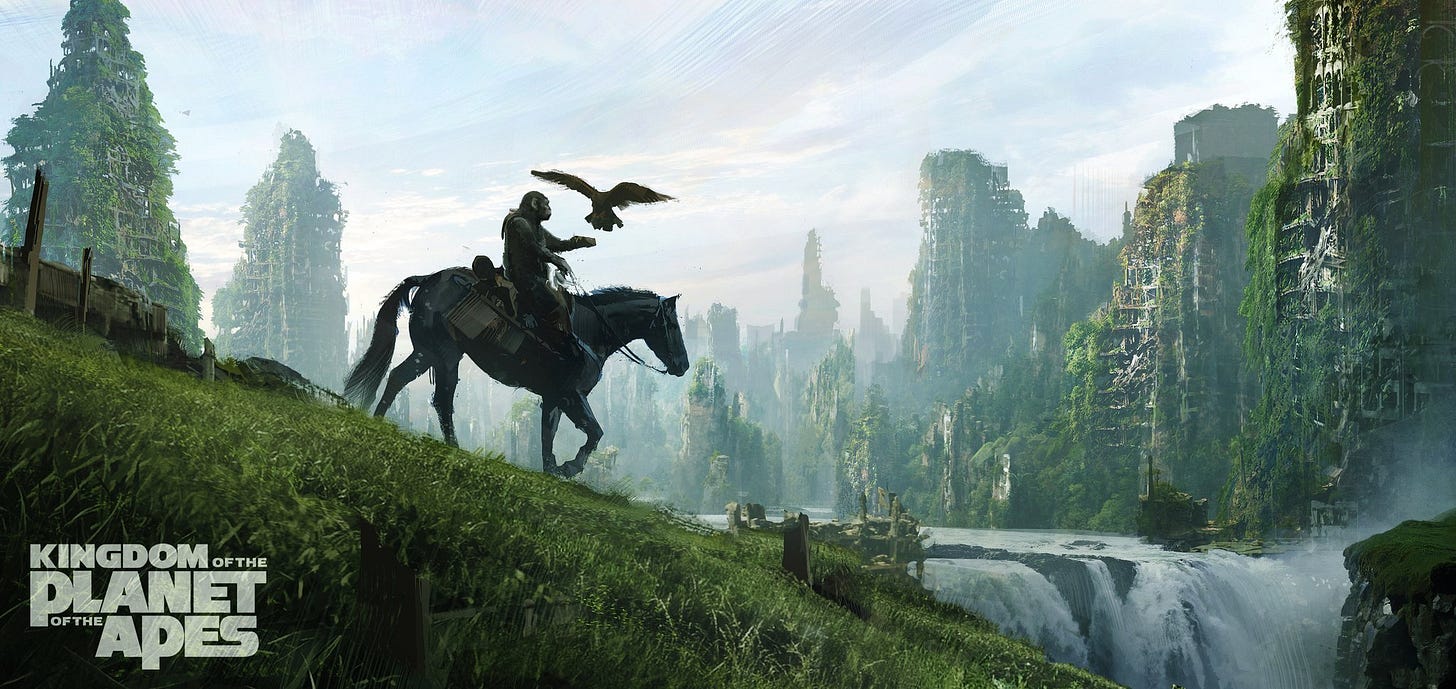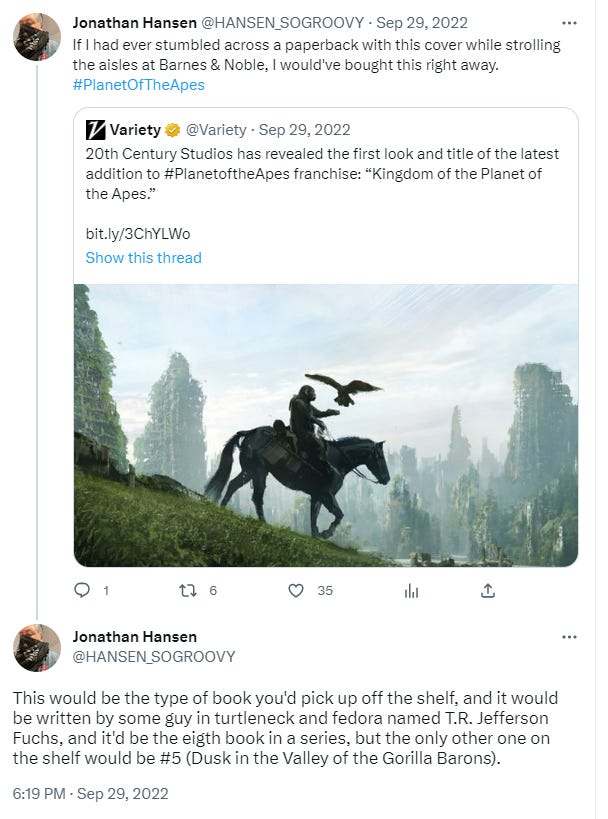The Planet of the Apes series, with its tale of a world that has become a mad house… A MAD HOUSE!… is a franchise that has always been a favorite Sunday afternoon TV or late night cable staple for me.
Based on La Planète des singes, a 1963 science fiction novel by French author Pierre Boulle, known in America as The Planet of the Apes, the British call it Monkey Planet apparently, which is not only ridiculous, but it’s also scientifically inaccurate, as monkeys are not apes. How embarrassing for the Brits, right?
God, no wonder we rebelled…
Anyway, telling a somewhat different story than the one most of us know from the American movie, La Planète des singes tells the tale of three human explorers from Earth who visit a planet orbiting the star Betelgeuse, which is a red supergiant star, the second brightest in the constellation of Orion, and something you should never ever say out loud three times in a row. The human explorers discover that the planet is ruled by intelligent great apes, and that the humans there are savage and animal-like. Trapped on the planet with no way home, the Earth visitors find themselves in a bit of a pickle, for as soon as they are captured, the apes force them to “mate” with beautiful and mostly mute young women.
Oh, the humanity!
The most common narrative style you’ll find with sci-fi books from that era and before is that the story is presented as if it were either being recounted to someone while at a dinner party or while sipping brandy by the fire, or it is also being read by someone at the same time as the reader is reading the book, like they have discovered an old diary or a set of letters. The latter is the case here, as the book is presented as if it were a message in a bottle that has been found floating in space. Also, the famous twist ending of the story in the book is actually closer to the weirdly inexplicable “twist” ending of the Tim Burton version of the film from 2001, and even in this context, it still doesn’t make any sense to me.
It turns out that the people who found the bottle floating in space, with the story of the human explorers inside, are also intelligent chimps. And after reading the story, the intelligent apes in their personal spacecraft toss it back out into space, believing it to be nothing more than pure fantasy, mostly because they find the idea of intelligent humans to be laughable.
Can’t really disagree with them on that…
The Original Series
“Take your stinking paws off me, you damned dirty ape!”
The original series of films include the following… Planet of the Apes, released on April 3, 1968, the sequel Beneath the Planet of the Apes, released on May 27, 1970, then comes Escape from the Planet of the Apes, which was released on May 21, 1971, followed by Conquest of the Planet of the Apes on June 29, 1972, and finally, Battle for the Planet of the Apes, which came out on June 15, 1973.
Telling the story of astronaut who crash lands in a future run by intelligent apes, who view the animal-like humans as pets, a situation that is revealed to be the result of a nuclear war that humans waged thousands of years before. The astronaut and the apes then discover that a cult of telepathic mutants live deep under the ruins of New York City, worshiping a still functioning atom bomb, which is finally set off, destroying the planet. However, some chimp scientists manage to use the astronaut’s ship in order to escape the destruction, going back in time to 1970s era New York City. Once there, despite an initial warm reception, the hatred and fear of the human race kills off the chimp scientists, But not before they have stashed their intelligent ape baby with a traveling circus. That baby grows into Caesar, the first ape to say no, who at first must hide his intelligence in a dystopian 1990s future where a virus has killed off cats and dogs and apes are now humanity’s main pet. However, due to the casual cruelty of the humans, Caesar can hide his true self no more, igniting a revolution that overthrows humanity, beginning a new era of ape dominance of the planet. Then, in the aftermath of the human nuclear war, Caesar, his apes, and some human survivors try to live in the rubble of the new world, struggling to create a new society, as the mutant humans and their atomic cult, as well as lingering ape hatred for humans, threaten to kill them all. Finally, the story jumps 600 years into the future, as the orangutan known as The Lawgiver recounts the legend of Caesar to a class of ape and human children, as they wait, still hoping for the day when the war between man and ape will come to an end, but before that can happen, years later, an astronaut from the past crash lands on the planet…
A incredibly weird and incredibly fun series of films, all of which are connected in a very satisfying time-loop, the first film was a critical and commercial hit. After that, the films only got better and stranger, peeking with the fourth film, Conquest, but at the same time, maybe got a little too weird for normal audiences, and the franchise was largely abandoned after the fifth film, Battle for the Planet of the Apes flopped.
Still, the series made a pop culture impact that can’t be denied.
There was an attempt at a TV show based off this series. It aired 14 episodes from September 1974 to December 1974 before it was cancelled, citing too many repetitive stories and too few apes, which seems like a fair complaint. There were also thirteen episodes of a half-hour long Saturday morning cartoon from one of the co-creators of Johnny Quest, called Return to the Planet of the Apes. It aired briefly from September to November of 1975 before it was cancelled and basically forgotten forever. Then in 1981, ten of the episodes from the live-action TV show were reedited into five terrible TV movies (which I also loved as a kid), all of which had the greatest titles ever… Back to the Planet of the Apes, the Forgotten City of the Planet of the Apes, Treachery and Greed on the Planet of the Apes, Life, Liberty and Pursuit on the Planet of the Apes, and finally, and perhaps most appropriately, Farewell to the Planet of the Apes.
And that was it. Finally wrung dry of blood, this ape-shaped stone was placed on a shelf in a back room somewhere on the Fox Studio Lot in Century City and forgotten. Thus an era of filmmaking came to an end, one that we will most likely never see the like of again.
Born in the wake of the 1960s civil rights movement, the original series was unafraid to use metaphor as a commentary on American society. While that metaphor certainly didn’t originate with this series, or with Boulle’s original novel, it’s also one that very quickly becomes a bit too problematic if you cling to it too hard.
Still, however unavoidably racist that metaphor is, it’s clear that the film’s battle between man and ape was meant to be seen as a stand-in for the racial strife that, due to its unavoidably racist history, is a deep-seated part of America. This film franchise reflects White America’s fear of the ideas of integration and equality, especially since they also champion the oppressed apes as being righteous in their fight against the injustices they experience at the hands of their clearly evil oppressors.
But like I said, the metaphor quickly becomes a little too problematic.
The idea that people of color are savage and uncivilized has long been used to justify their subjugation, and for violence to be used against them, be it through colonialism, through slavery, through Jim Crow, on and on, pick your example in American history. Because of this, I can understand if this simply looms too large in this franchise for someone to be able look past and enjoy as pure entertainment.
I don’t think the Planet of the Apes series is deliberately racist itself. It’s definitely one that can be pretty tone-deaf at times, but I think it stems from a well-intentioned place at least, for whatever that’s worth, especially since we’re talking about the well-intentions of white people. So while acknowledging its central metaphor’s issues, I think it’s also fair to point out that at the very least it’s pretty much always aimed at the actual cause of the whole problem.
But y’know… your mileage may vary.
I recently rewatched the whole original series when it aired one weekend on one of the weird extra broadcast channels we get because we still have an antenna attached to our TV, and honestly, I think that this is how these films should always be watched now. Just randomly on some lazy Sunday afternoon, a cool breeze coming through the window, and a mellow indica gummy in your tummy, as the ape-centric action and its searing political commentary wash over you, occasionally punctuated by commercials with Ice T and Vivica A. Fox shilling for Car Shield, or the human (or puppet) version of Cranky Martha refusing to update her Medicare, or by that perennial local favorite, and former Minneapolis mayoral candidate, Fancy Ray (who I once appeared in a commercial with) selling me some “So Low Meat” from the So Low Meat Store.
Good times.
The Ill-Conceived Misfire
For years after that, there were multiple and ultimately failed efforts to relaunch the Planet of the Apes series, which finally led to Planet of the Apes being released on July 27, 2001, the end result of multiple writers, and director Tim Burton.
And while there’s some really cool designs here, and Tim Roth and Paul Giamatti were both amazing, as was Rick Baker’s incredible make-up, and honestly, the sexual chemistry between Mark Wahlberg’s stranded astronaut Leo Davidson and Helena Bonham Carter’s chimpanzee human-rights activist Ari was undeniable, and I really wish the movie had had the guts to hook them up, and then film a ridiculously graphic sex scene between them, the film unfortunately had other plans, terrible and dumb plans, so… c'est la vie, it was not to be.
In the end, the less said about this wet fart of a failed film the better.
The Worthy Successors
A decade later, against all odds, 20th Century Fox not only managed to get a relaunch off the ground, it somehow turned out to be really good. A surprisingly smart, brutal, dark, and weird film series, it tells the story of Caesar, the first ape to say no, and the struggles of the new nation he creates, the triumphs it will celebrate, the tragedies it endures, and the sacrifices and compromises it must make to survive.
Rise of the Planet of the Apes
“Why cookie Rocket?”
Will Rodman is a scientist in San Francisco working on a drug he hopes will cure his father's Alzheimer's disease. Despite initial success, a lab accident cause his work to be shut down, and Will becomes the guardian of Caesar, an infant chimp exposed in-utero to Will's experimental drug. Caesar displays unusual intelligence, and with him, Will continues to work on his experiments in secret. But as Caesar's intellect grows, he soon comes to represent a threat to man's dominion over Earth.
Like I said, this is a surprisingly good reboot, and it is also an actually good film. Filled to the brim with a plethora of nods and homages to the original, none of which gets in the way of the film’s actual story, even the pivotal moment that uses perhaps its most famous line, all while utilizing some of the best motion capture artists alive, this is a movie that clearly understands from the start that it can’t simply reboot these films—because how could you possibly recapture that kind of magic—so it has to make new magic.
And it does.
Caesar’s mother was stolen from her jungle home, and then shipped across the world to a lab in San Francisco. There, she is given an experimental drug called ALZ-112, a potential cure for Alzheimer’s, and as a result she begins to exhibit a shockingly fast development of intelligence. But while protecting her newborn baby, she is killed, the experiments are shut down, and Caesar is smuggled out of the lab by Will Rodman, so that he won’t be destroyed like the other lab animals.
Due to his having been exposed to ALZ-112 in the womb, Caesar is very smart, and quickly grows smarter. Will hopes this development might lead to an Alzheimer’s cure for his father, a once brilliant man who is suffering from the disease, and over the next few years, Caesar becomes a part of their family too. For a time, they are happy, but eventually, a too smart, too curious, and very lonely chimp in the suburbs soon leads to trouble with the busybody neighbors. Caesar is seized by animal control, and finds himself locked in what amounts to an abusive and ugly prison for apes.
This is where Caesar’s revolutionary ideals are born. This is where he begins to build power amongst his other imprisoned apes. This is where he meets the always reliable orangutan Maurice, the hot-headed chimp Rocket, as well as Buck, the big gorilla, and the angry and scarred Koba. Finally having had enough at the hands of the humans in charge of the center, Caesar sneaks out, and returns with samples of ALZ-112, and exposes the other apes too.
Soon enough, they’re planning an escape.
This trilogy of films is the story of the father of the ape nation, the hero of legend, Caesar, the first chimp to say no, the great revolutionary leader who united the ape tribes, broke the bonds that shackled them, and through fire and fury and strife, led his people to the promise land. It’s a surprisingly intimate and wrenching version of the hero’s journey. Anchoring the events in the film in clear, simple emotions often tied directly Caesar’s evolution. The chimp is a surprisingly effective main character, and entry point into the story, his pain easily becomes your pain, and his triumphs easily become your triumphs.
It’s a fantastic performance by the legendary Andy Serkis.
But this first film isn’t just about Caesar’s awaking and the first skirmishes between ape and man, for the birth of Caesar was also a herald of the end of the Age of Man, and not just because of the small band of intelligent apes that escape the city and into the redwood forests north of San Francisco either, but in the accidental development of a disease, the result of a human having been exposed to an untested variant of ALZ-112. After watching the world refuse to deal with COVID, it’s hard to say that it isn’t an accurate and deserved fate either. Extremely virulent, highly infectious, it’s a virus with an extremely high rate of mortality. By the end of the film, the “simian flu” as its dubbed, is quickly spreading across the face of the planet, most likely due to the fact that most humans are really stupid and incredibly selfish assholes who refuse to wear any kind of PPE because of their precious Free-dumbs. Also, an added bonus, Caesar and his apes beat the absolute fuck out of a bunch of cops, so that’s pretty cool.
Showcasing the fact that chimps are both dangerous and terrifying, the film doesn’t just deal with the righteous revolution of the oppressed, it also explores the need for freedom and self-determination, as well as the benefits of both found families and in finding your community.
There is a lot of vulnerable adult stuff that might be a little tough to watch, as the Will’s dad suffers from Alzheimer’s in a country that abandons the chronically ill, and also with the fear and xenophobia of society, as Caesar tries to find his own place in the human world. And yes, it’s true, James Franco does have a starring role, but he doesn’t appear in any of the other ones, and besides, the film also features Brian Cox, John Lithgow, and the guy who played Draco Malfoy, not to mention Frida Pinto, who is lovely, so while you can’t win them all, you can at least win some.
Honestly, how exactly the filmmakers were able to make such a good-looking film like this, such a strange film like this, one that overwhelmingly features a bunch of mo-cap artists pretending to be apes, in the extremely risk averse system of today’s big studios is a continual mystery to me, but I’m very thankful that it happened, because I really loved the new Planet of the Apes series.
Dawn of the Planet of the Apes
“Beware the beast Man, for he is the Devil’s pawn. Alone among God’s primates, he kills for sport or lust or greed. Yea, he will murder his brother to possess his brother’s land. Let him not breed in great numbers, for he will make a desert of his home and yours. Shun him; drive him back into his jungle lair, for he is the harbinger of death.”
— The Lawgiver, (as spoken by Cornelius in Planet of the Apes, 1968)
Ten years after the simian flu has wiped out the majority of the world's homo sapiens, genetically enhanced chimpanzee Caesar and his ever-growing band of followers have established a thriving colony in Muir Woods outside the overgrown ruins of the once thriving city of San Francisco. When a band of humans emerge from the city and enter the forest, in order to avoid war, Caesar must balance the need to protect his people, all while re-establishing a relationship with the remaining human population.
“If you have a fever and a cough or a sore throat, stay home.” This is the warning that you hear in the opening montage at the beginning of the film, showing us the end of the human world.
Spoiler: the dumb shits didn’t listen.
Maybe that’s not that much of a spoiler at this point.
Dawn of the Planet of the Apes, a film released about six years before COVID, has an opening montage that now feels a bit Cassandra-ish in hindsight. In this opening, the “simian flu” is busy decimating the world. The camera pans across the globe, showing planes hoping across the globe, and countries filling up with red as the virus spreads, and then, as the world continues to turn, that red begins to go out, eventually leaving almost the entire planet dark as the majority of humanity finally succumbs, going all but extinct as the Age of Man grinds to a halt.
Meanwhile, on the slopes of Mt. Tamalpais, Caesar is the king of a forest kingdom, and he has a son named Blue Eyes, who strains at the bonds his father places on him, yearning to prove himself, and to be seen as an adult. Koba and Rocket are leaders in the community, and Maurice teaches the young ones to read and write, as well as the simple laws that govern their community: Ape Not Kill Ape. Apes Together Strong. And finally, Knowledge Is Power. Caesar’s wife Cornelia is pregnant again, soon to give birth, and although he sometimes still misses his human family, all of whom are long gone now, Caesar is happy. Looking out over the width and breadth of his kingdom, he feels satisfied.
Plus, it’s been two years since the community has seen any sign of a human.
But then Blue Eyes and his friend Ash, Rocket’s son, come across humans in the forest. The human shoots Ash in a panic, and the apes come a’runnin’ ready to whip some ass, but Caesar lets the humans go. This upsets the ape community. Koba in particular chafes at Caesar’s hesitation to kill off the humans. Instead, in a massive show of ape force, war-painted up like bone-white specters of death, Caesar and his army shows up at the gates of the human stronghold in the San Francisco ruins, the once magnificent metropolis now littered with the ugly remains of humanity’s demise. Caesar bars the humans from ever crossing the Golden Gate Bridge into ape territory again, which seems reasonable, you stay in your area and we’ll stay in ours, but the problem is, there’s a dam up there that humans want to repair and get running again, so that they’ll have electricity again, and now both sides are on the edge of panic, both sides want something, and soon enough, both sides are ready to go to war.
At first there’s a truce made, but both man and ape are wary, mistrustful of one another. On one side stands the humans, dumb, greedy, and harbingers of trouble, their entitlement blinding them, and they will stop at nothing to reclaim what they see as rightfully their’s… which is the entire world. On the other side, there is an ape community that has begun to fracture under Caesar’s leadership, especially upon his restraint at the human’s transgressions. The need for vengeance, the blood lust at the memory of the harm endured at humanity’s hands, it is too much for some of the apes to bear. Once these two sides begin to mingle, there is no stopping the anger and the recriminations, the betrayals, and the inevitable bloodshed.
It’s clear that this was only ever going to end one way.
Beginning with the mundane day to day following a revolution, once the romance of a successful rebellion has faded and the boring reality of regular every day life has taken over, the film starts and ends on symmetrical closeups. The first one speaks of a quiet and hope-filled future, while the second shows the realization that survival can only be purchased with blood and fire, and at the cost of one’s own soul, because this is a film about greed and selfishness, about the legacy of pain and the cycle of abuse, about xenophobia and fear, and how all of this leads inevitably to conflict.
Truly, Caesar wears his jeweled crown upon a troubled brow.
Featuring echoes of the Old Testament and Westerns about Manifest Destiny, this movie really excels by being sympathetic to both sides and each character. Caesar’s decisions all make sense, but then, so do Koba’s. Malcolm’s decisions make sense, but Dreyfus’s do too. While the humans definitely have their share of assholes, there’s no shortage of them on the apes’ side too. Best of all, when you trace the chain of events that leads to the big conflict, the question of who exactly started it all and why, and what could’ve maybe been done to prevent the carnage and death, even if there is clearly one person to blame, is a murky one. It all feels inevitable.
Good news… this time, not only is there no James Franco, and not only do the world’s greatest motion capture actors return, but we also get Gary Oldman and Kerri Russell in this film, so that’s really great. On top of that, the film also features apes charging on horseback while firing dual machine guns, which is probably in the dictionary as the definition of awesome.
War for the Planet of the Apes
Beware the beast Man indeed…
In the fallout of the events of the previous film, Caesar and his apes are forced into a deadly conflict with an army of humans led by a ruthless colonel. After suffering some unimaginable losses, Caesar sets out on his own a quest of vengeance. Finally brought face to face, Caesar and The Colonel are pitted against one another in an epic battle that both believe will determine the future of the planet, only to discover that the answer to that question was already decided long ago.
Picking up 15 years after Caesar first led his people into the redwood forests of Northern California and a deadly virus wiped out most of humanity, and 2 years after the treacherous Koba attempted to assassinate Caesar in order to have his vengeance on the human community in the ruins of San Francisco, the third film begins in the middle of a prolonged conflict between ape and man.
Two years prior some of the last remnants of the U.S. Army, led by a brutal, ape-hating officer known as The Colonel, arrived to find San Francisco deserted, and its colony of survivors dead or scattered, and are now on a quest of vengeance. Caesar—still haunted over having to kill Koba—is leading an insurgency against the relentless remnants of humanity, as they flail violently about in their species’ death throes, and his apes have been pushed deeper and deeper into the redwoods. Worst of all, there’s collaborators amongst the apes, as former Koba loyalists work with the humans.
In a last ditch attempt to save his people, Caesar decides to lead his people far away from their long time Northern California home, over mountains and desert, to a green and beautiful valley far away, but before they set out on the long journey, the Colonel’s forces discover the apes’ hidden base. In the dead of night, their faces painted in oily camouflage, the Colonel raids the apes’ camp, killing Caesar’s wife Cornelia and his son, Blue Eyes. Only his youngest son, the toddler Cornelius, manages to survive. Worst of all, it turns out they were betrayed by one of their own.
Black with anger, hungry for revenge, and looking to distract the Colonel and his soldiers as the others escape, while also knowing that the apes will never be safe as long as The Colonel is alive, Caesar sends his remaining apes, including his young son, ahead to this new land, while he and a small band made up of the magnificent Maurice, the ever-faithful Rocket, and the mighty gorilla Luca, ride off like heroes out of a Western, bent on saving a town that has been overrun by a gang of outlaws.
Along the way, Caesar and his little band meet two new friends. The first is a young mute girl named Nova, so named after the remnants of a Chevy Nova. Her presence illustrates the heroes’ knight-errant-like nobility.
“We cannot take her, Maurice,” Caesar says.
Maurice just nods, signing, “I understand, but I cannot leave her.”
They also meet Bad Ape, a gollum like little weirdo chimp, a refugee from a zoo somewhere, now living alone in an abandoned ski resort. The apes don’t know Bad Ape. He’s not from their group, but he can talk like Caesar, and he’s intelligent, if a little off, which shows Caesar and the others that there are other apes out there like them, and that, as the virus was spreading across the globe, infecting and killing off the humans all those years ago, it was also infecting apes and making them smarter.
When they finally catch up to the Colonel, they discover that he has captured and imprisoned Caesar’s tribe as they tried to escape the forest, including Caesar’s young son. Caesar has no choice. He is captured, and our war movie, that became a western road movie, becomes a prison-break film as the Colonel attempts to break Caesar, to break the apes, and Caesar’s leadership over them. During this, it becomes clear that the Colonel is a madman, a rogue legate at the head of his zealous legions, who is now preparing for a last stand, because he is being hunted by his own, and the apes are now caught in the middle of a coming storm.
But Caesar has figured out another secret too.
Not only is the Colonel alone, but he is trying to cover up the fact that those who survived the virus are not totally immune, but are susceptible to a variant that causes humans to lose their ability to speak, to regress, and become more animal-like, and he is killing his own men to keep this secret. Finally, the Colonel himself succumbs to the variant virus, unable to speak, the man who made a beast of himself now fated to actually become a beast; and Caesar the Ape, the beast who strived to be better than man, shows him the mercy the Colonel was never capable of showing others himself, and thus, Caesar breaks the cycle of violence…
For now, at least.
As the last sands of the Age of Men tumble through the narrow neck of the hourglass, and the Fall of Man is revealed to be as inevitable as the Rise of the Ape, Caesar pulls down the tattered and burning flag of a long dead nation, a moment that becomes more and more heavy with meaning as the days pass…
In perhaps its worst decision, the film drags on a bit here, finally ending with Caesar leading his people to that distant valley, and like Moses at the promised land, watches hopefully from its edge as the sun dawns on a new age.
Heavy with references to America’s long long history of imperialism around the world, and the legacy of violence and hatred and pain it gave birth to, this is a film about the awful legacy of war, and also the film that most mirrors our own modern day world. A story about the cost of anger and vengeance, and of how fear, ignorance, and xenophobia causes us to lash out, to try to destroy the things we don’t understand, to violently control those we see as different from ourselves, this is a film—especially in the wake of anti-vaxxers and Trumpism—that most clearly shows us who our society truly is, and it’s almost solely through the actions of The Colonel and his fanatical legions. And while the film does hinge on the benefits of showing mercy, this really feels more like a mythical aspect, the aspirational actions of a legend, the fairy tale bit. Especially since it’s fair to point out that while sparing the traitorous ape’s life ended up saving his own, sparing the “nice” human’s life is what nearly got Caesar killed.
Two things I loved? Woody Harrison shows up as a fantastic lunatic post-apocalyptic soldier still clinging to a world order that is ten years dead. And also, a key part of the ape’s prison escape plan hinges on poop-throwing…
So that’s awesome.
I really loved this new series, something I did not expect to happen, simply because reboots and re-imaginings almost never work out to even equal the originals, let alone surpass them, which I think is a position that could maybe be argued here. I don’t know if you would win that debate, but still… it’s a strong position. I’m not going to try to claim that these are the greatest films of all time or anything, that they don’t get a little long and heavy-handed at times, but whatever flaws these films might have are all easily buried beneath their myriad positive aspects.
Plus, I will never not be shocked that 20th Century Fox actually agreed to spend money on these films. It floors me. Studios like Fox generally don’t make movies like this, not for this price tag. These films were actually pretty good, and were financially successful too obviously, and that’s why they kept making them, but that’s something you can easily see after release, after the money is spent. In the pitch stage, before the greenlight, something like that is much harder to bet on, especially if you’re talking about a film mostly centered on talking CGI apes. The idea that modern American audiences would connect to something like that? It’s redefines risky, and I just can’t believe Fox would take such a risk.
We just got lucky somehow.
That’s it. We got luck that not only did they make this trilogy, and that they turned out to be actually good, but now they’ve made a fourth one too?
So I’m definitely looking forward to Kingdom of the Planet of the Apes.
This hasn’t been released on streaming yet, and I don’t go to theatres anymore, because only a fool would risk a potential long-term disability for a COVID exposure, and all for an overly-expensive experience that will probably be poorly shown, and will definitely be ruined by the other idiots in the theatre, so I am eagerly awaiting the chance to watch it in my own home, and not just because I love this franchise, but also because the first teaser image that was released? The image below?
It’s so awesome.
Look at that… When it came out back in 2022, I talked about how much I liked it.
Can’t wait.


